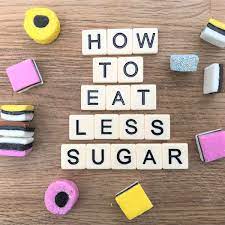10 Ways to Eat Less Sugar
 If you want to reduce your sugar intake, you will need to look beyond cutting back on the obvious sweets like candy and desserts. That's because added sugar is one of the most common ingredients used in a wide variety of food and drinks. Unfortunately, that's a big part of why obesity rates, as well as chronic illnesses such as diabetes and heart disease, have been on the rise over the last 30 years and gives us serious reasons to reduce sugar intake. Here are 10 nutritional tips that can help you cut back on sugar.
If you want to reduce your sugar intake, you will need to look beyond cutting back on the obvious sweets like candy and desserts. That's because added sugar is one of the most common ingredients used in a wide variety of food and drinks. Unfortunately, that's a big part of why obesity rates, as well as chronic illnesses such as diabetes and heart disease, have been on the rise over the last 30 years and gives us serious reasons to reduce sugar intake. Here are 10 nutritional tips that can help you cut back on sugar.
- Ditch the sugary drinks.
Sweet beverages like sodas, juices, sports drinks, and even fruit smoothies contain high amounts of sugar -- which is really bad for your health. Therefore, you should swap these sugary drinks for healthier alternatives:
- Water
- Unsweetened seltzer
- Unsweetened tea
- Zero-sugar sports drinks
- Drink your coffee black or with a natural sweetener.
Many people drink their coffee with either sugar or flavored sweeteners. If you are one of those culprits, you should switch to drinking your coffee black, or with a natural sweetener like Stevia.
- Opt for plain yogurt.
A lot of people eat yogurt for their digestive health. Unfortunately, many of the flavored yogurts contain high amounts of sugar. Therefore, instead of eating flavored yogurt, you should opt for plain yogurt -- and then sweeten it naturally with frozen or fresh berries.
- Eat less sugary snacks.
Instead of snacking on your favorite candy or baked goods, consider a less sugary alternative. For example, dark chocolate contains less sugar than regular milk chocolate. You can also snack on fruit and nuts.
- Use low-sugar alternatives to sweet salad dressings.
Unfortunately, many of the most popular and delicious salad dressings -- such as honey mustard -- are high in sugar content. However, instead of putting a sweet salad dressing on your salad, you can opt for vinegar or olive oil.
- Choose condiments with zero added sugar.
In addition to sweet salad dressings, many of the condiments that people put on their food contain a lot of sugar as well. However, you can find ketchup, mustard, marinades, and dipping sauces with zero added sugar.
- Avoid sugary cereals and granola bars.
If your breakfast routine includes sweet cereal and/or granola bars, then you need to make healthier breakfast choices. For example, you should look for cereals and granola bars that contain less than four grams of sugar per serving. Even better, swap your bowl of cereal for a bowl of oatmeal or rolled oats with fresh berries.
- Find alternatives to sweet spreads.
Do you use a lot of sweet spreads like jelly and Nutella? If so, consider replacing them with a natural, low-sugar alternative such as nut butter.
- Avoid refined carbs (carbohydrates).
As mentioned, not all of the foods you eat contain obvious sugars. For example, many of the processed foods that people eat contain high amounts of refined carbs -- carbs that end up breaking down into sugar once they are digested. However, foods made from whole grains contain far fewer refined carbs -- making them a lot healthier to eat.
- Focus on buying fresh, whole ingredients when grocery shopping.
Lastly, when you go to the grocery store, focus on buying fresh foods and ingredients as much as possible to limit your consumption of processed foods high in sugar content. Nutritionists often recommend shopping the perimeter of the grocery store, which is more likely to contain fresh, whole ingredients, to avoid all of the aisles filled with unhealthy meal and snack choices.
In short, you need to get strategic about the kinds of food and drinks you consume if you want to reduce your intake of sugar. For example, ditch sugary drinks and flavored coffee sweeteners. Opt for plain yogurt and healthy snacks as an alternative to sweets. Furthermore, you should use low-sugar alternatives to sweet salad dressings, condiments, and spreads. Make sure that you are making healthy breakfast choices as well. Limit your consumption of refined carbs. Also, make an effort to buy fresh, whole ingredients and foods at the grocery store. Keeping a food diary is also a great tool that can help you reduce your consumption of sugar.
